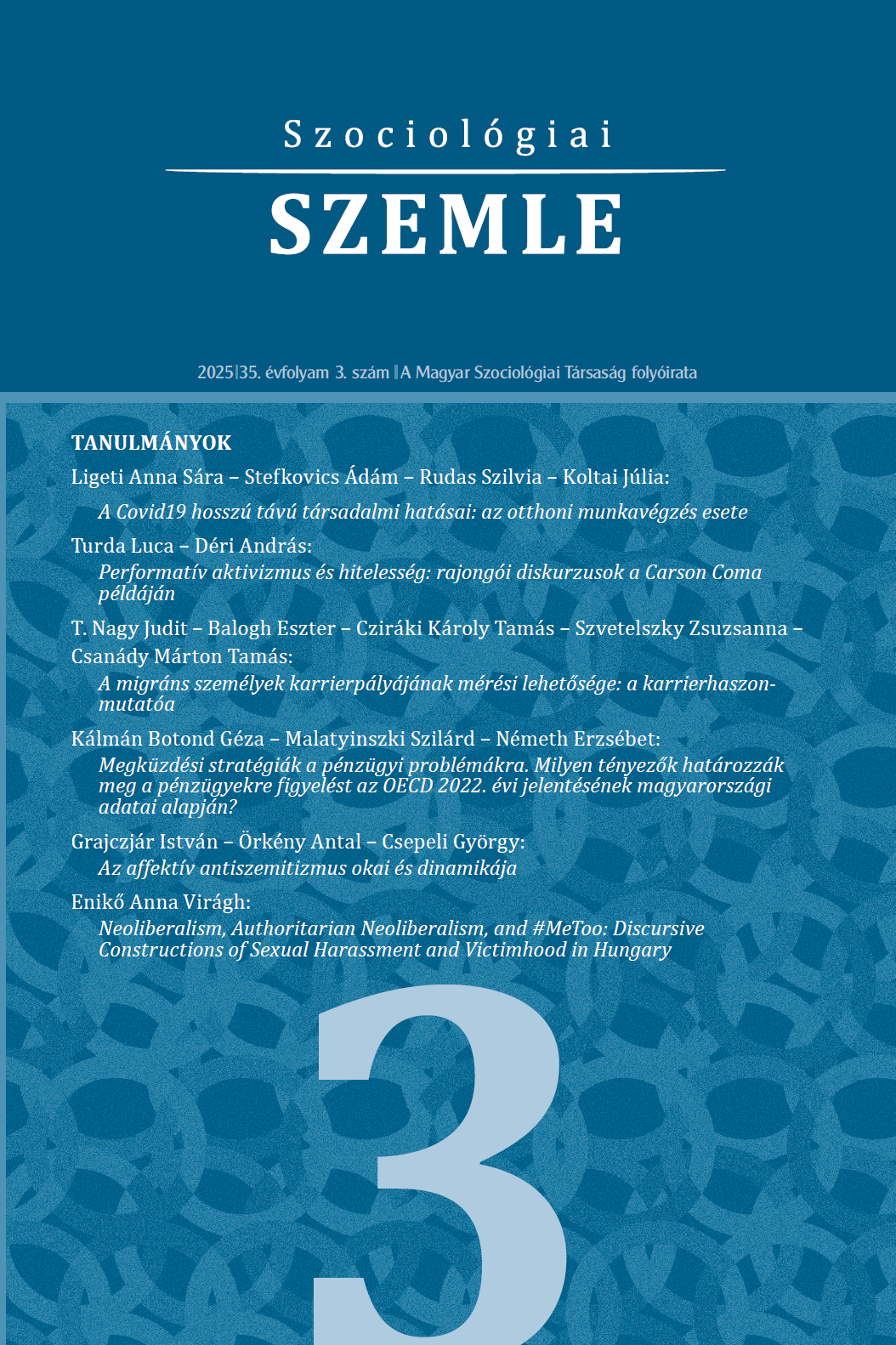Az affektív antiszemitizmus okai és dinamikája
Absztrakt
A cikkben 2023 októberében ezerfős országos reprezentatív mintán személyes megkereséssel végzett kérdőíves kutatásunk alapján vizsgáltuk a magyar felnőtt lakosság zsidókkal kapcsolatos pozitív és negatív érzésvilágának mentális térképét. Azt találtuk, hogy az affektív antiszemitizmushoz vagy annak ellentétéhez, a zsidókkal való rokonszenvhez vezető út döntő állomása, hogy a válaszadók lehetségesnek vagy lehetetlennek tartják-e a zsidók és nem zsidók megkülönböztethetőségét. A filoszemiták a zsidókat és a nem zsidókat megkülönböztethetetlennek tartják, szemben az antiszemitákkal, akik ezt tagadják. A filoszemiták zsidók iránti rokonszenvéhez vezető út állomásai az önkritikus emlékezetpolitika, a zsidók és nem zsidók közötti konfliktus elutasítása és annak tagadása, hogy a zsidók lojálisabbak lennének Izraelhez, mint Magyarországhoz. A zsidókkal szembeni ellenszenvhez (az affektív antiszemitizmushoz) az antiszemitizmus minden egyéb dimenzióján keresztül vezet az út, amelynek döntő állomása a zsidók Magyarország iránti lojalitásának kétségbevonása. A zsidók érzelmi alapú elutasítása azonban közvetlenül nem kapcsolódik sem az elsődleges, kognitív antiszemitizmushoz, sem a holokauszt jelentőségét lebecsülő másodlagos antiszemitizmushoz: a zsidókhoz való negatív érzelmi viszony feltétele a kirekesztő antiszemitizmus tételeinek elfogadása.
Hivatkozások
Abady, F. C. (2020): The psychology of modern antisemitism: Theory, research and methodology. In Lange, A. – Mayerhofer, K. – Porat, D. – Schiffman, L. (eds): Comprehending and confronting antisemitism: A multi-faceted approach. Vol. 1. De Gruyter, 271–298.
Adorno, T. W. – Frenkel-Brunswik, E. – Levinson, D. J. – Sanford, R. N. (1950): The authoritarian personality. Harper & Brothers.
Agnew, R. (1992): Foundation for a general strain theory of crime and delinquency. Criminology, 30(1), 47–88.
Allport, G. W. (1977): Az előítélet. Társadalomtudományi Könyvtár, Gondolat Kiadó.
Bandura, A. (1999): Moral disengagement in the perpetration of inhumanities. Personality and Social Psychology Review, 3(3), 193–209.
Bauman, Z. (2016): Strangers at our door. Polity Press.
Bergmann, W. (2011): Geschichte des Antisemitismus. Vol. 2187. C. H. Beck.
Bredin, J.-D. (1986): The affair: The case of Alfred Dreyfus. George Braziller Inc.
Cohn, N. (1967): Warrant for genocide: The myth of the Jewish world-conspiracy and the Protocols of the Elders of Zion. Harper & Row.
Csepeli, G. – Grajczár, I. – Örkény, A. (2023): Antiszemitizmus Magyarországon és a Szimhat Tora háború: Egy szociológiai felmérés eredménye. Múlt és Jövő, 3.
Csepeli, G. – Örkény, A. – Székelyi, M. (2000): Grappling with national identity: How nations see each other in Central Europe. Akadémiai Kiadó.
Eatwell, R. (2003): Fascism: A history. Vintage.
Evans, R. J. (2003): The coming of the Third Reich. Penguin Books.
Festinger, L. (1957): A Theory of Cognitive Dissonance. Stanford University Press.
Fiske, S. (2006): Társas alapmotívumok. Osiris.
Fredrickson, G. M. (2002): Racism: A short history. Princeton University Press.
Glaeser, E. L. (2005): The political economy of hatred. The Quarterly Journal of Economics, 120(1), 45–86.
Glick, P. – Fiske, S. T. (2001): An ambivalent alliance: Hostile and benevolent sexism as complementary justifications for gender inequality. American Psychologist, 56(2), 109–118.
Goldhagen, D. J. (1996): Hitler’s willing executioners: Ordinary Germans and the Holocaust. Alfred A. Knopf.
Greenwald, A. G. – Banaji, M. R. (1995): Implicit social cognition: Attitudes, self-esteem, and stereotypes. Psychological Review, 102(1), 4–27.
Holz, K. (2010): Nationaler Antisemitismus: Wissenssoziologie einer Weltanschauung. Hamburger Edition.
Horkheimer, M. – Adorno, T. W. (1947): Dialectic of enlightenment. New York: Herder and Herder.
Hyman, P. (1998): The Jews of modern France. University of California Press.
Kovács, A. – Fischer, G. (2021): Antisemitic prejudices in Europe: Survey in 16 European countries. Budapest: Institute for Jewish Policy Research.
Laqueur, W. (2006): The changing face of anti-Semitism: From ancient times to the present day. Oxford University Press.
Miller, J. (1997): The drama of the gifted child: The search for the true self. Basic books.
Mudde, C. (2007): Populist radical right parties in Europe. Cambridge University Press.
Nirenberg, D. (2013): Anti-Judaism: The Western tradition. W. W. Norton & Company.
Nussbaum, M. C. (2018): The monarchy of fear: A philosopher looks at our political crisis. Harvard University Press.
Pettigrew, T. F. – Tropp, L. R. (2006): A meta-analytic test of intergroup contact theory. Journal of Personality and Social Psychology, 90(5), 751–783.
Postone, M. (2000): Anti-semitism and national socialism. Chronos Publications.
Pulzer, P. (1988): The rise of political anti-Semitism in Germany and Austria. Harvard University Press.
Salzborn, S. (2010): The politics of antisemitism. Journal for the Study of Antisemitism, 1, 89–115.
Sartre, J.-P. (1948): Antisemitism and Jew. Paris: Schocken Books
Sik, E. (2016): Egy hungarikum: A morális pánikgomb. Mozgó Világ, 42(10), 67–80.
Staub, E. (1989): The roots of evil: The origins of genocide and other group violence. Cambridge University Press.
Stern, F. (1965): The politics of cultural despair: A study in the rise of the Germanic ideology. University of California Press.
Tajfel, H. – Turner, J. C. (1979): An integrative theory of intergroup conflict. In Austin, W. G. – Worchel, S. (eds): The social psychology of intergroup relations. Brooks/Cole, 33–47.
Wistrich, R. S. (1991): Antisemitism: The longest hatred. Pantheon Books.
Zick, A. – Küpper, B. – Hövermann, A. (2011): Intolerance, prejudice and discrimination: A European report. Friedrich-Ebert-Stiftung.
Zick, A. – Wolf, C. – Küpper, B. – Davidova, E. (2008): The syndrome of group-focused enmity: The interrelation of prejudices tested with multiple cross-sectional and panel data. Journal of Social Issues, 64(2), 363–383.
Zimbardo, P. G. (2007): The Lucifer effect: Understanding how good people turn evil. Random House.





